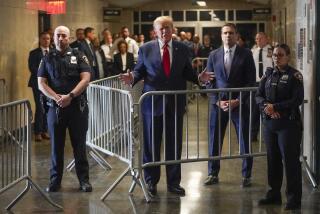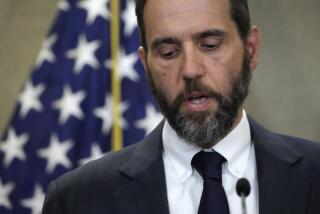Microsoft Asks High Court to Intervene
Claiming its trial was tainted by judicial misconduct, Microsoft Corp. on Tuesday asked the U.S. Supreme Court to set aside the landmark ruling that it violated antitrust laws and to force the government to start over with a new judge.
The software giant also asked a federal appeals court to delay any further proceedings until the Supreme Court decides whether to accept the case. But the high court is unlikely to act on the matter before late September, leading some critics to charge that the company’s action is little more than a delaying tactic.
Unless a federal appeals court grants Microsoft’s request for a stay, the case is expected to go back to a new federal district judge in Washington this week.
The company’s much-anticipated filing with the Supreme Court comes more than a month after the U.S. Court of Appeals in Washington ruled that Microsoft illegally monopolized the market for computer operating systems.
In that ruling, the appeals court also set aside a breakup order for Microsoft, finding that the trial judge, Thomas Penfield Jackson, improperly held secret meetings with reporters to discuss the case during and after the trial. In those interviews, Jackson frequently questioned the honesty of Microsoft executives, including Chairman Bill Gates.
Worried about the appearance of bias, the appeals court ordered that a new judge be appointed for the next phase of the trial, which will determine the appropriate punishment for Microsoft.
In the filing Tuesday, Microsoft essentially argued that the appeals court should have gone further and also thrown out Jackson’s 120-page findings of fact, which outlined Microsoft’s illegal behavior and became the basis for the court’s ruling that Microsoft violated the Sherman Antitrust Act. Microsoft said if it had known about the interviews during the trial, it would have immediately asked for a new judge.
“The only reason the district judge was not disqualified before issuing his findings of fact is that he embargoed his secret interviews,” Microsoft asserted in its filing. “The judge’s rulings should not be permitted to stand simply because he concealed his egregious misconduct.”
In particular, Microsoft said it was worried that plaintiffs in nearly 150 private class-action suits against the company will use Jackson’s findings to support their cases.
Government antitrust officials said Tuesday that they will oppose Microsoft’s appeal and fight any attempt to delay court proceedings.
“We think it is best to get this case going forward again at the District Court,” said Iowa Atty. Gen. Tom Miller, one of 18 state officials who joined the Justice Department in filing the antitrust suit.
A Justice Department spokeswoman said the appeals court, in its unanimous June 28 ruling, had already dealt with the issue of Jackson’s misconduct. “We will respond promptly to their filing,” spokeswoman Gina Talamona said.
Microsoft critics dismissed the Supreme Court filing as a delaying tactic.
In the next few weeks, the company plans to ship the code for its next-generation Windows XP operating system to computer manufacturers. Competitors, such as Eastman Kodak and AOL Time Warner, are lobbying the government to block the new product, saying XP relies on the same anti-competitive features that spurred the government’s original lawsuit.
Chances are slim that the Supreme Court will hear the Microsoft case, attorneys said. The high court rejects more than three-fourths of the nearly 1,200 cases it is asked to review each year, and applications for cases in which an appeals court has ruled unanimously fare even worse.
But one legal expert said Microsoft might catch the court’s attention by framing its appeal around judicial misconduct and, as Microsoft states in its appeal, the importance of “restoring public confidence in the integrity of the judicial system.”
To help bolster its case, Microsoft cited other instances of judicial misconduct and argued that there were discrepancies in how various cases were handled across the country.
Supreme Court justices “have a special interest in making sure the integrity of the judiciary is maintained,” said University of Chicago law professor Randal Picker, who has written on the Microsoft case. “Microsoft chose exactly the right issue.”
Others, however, doubted that the Supreme Court would involve itself in deciding whether Jackson’s action merited a new trial, preferring instead to leave such matters to the discretion of appellate judges.
“It’s hard to see how this is the sort of issue that the Supreme Court is going to get very excited about,” said Mark Popofsky, an antitrust attorney in Washington who previously worked at the Justice Department. “I think it’s interesting that Microsoft didn’t appeal the case on its merits and instead is going for something that would just vacate everything.”
Officials at Microsoft declined to comment Tuesday.






